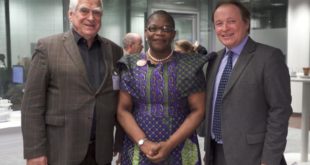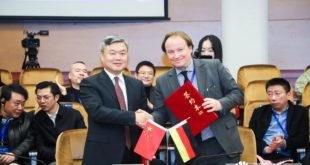Jean-Christophe Bas is opening the Dialogue of Civilizations Institute Forum in Rhodes (October 2019)
Jean-Christophe Bas, the CEO of the Dialogue of Civilizations Institute has delivered the welcome address to participants from around the world attending the 17 th edition of the Rhodes Forum https://doc-research.org/wp-content/uploads/2019/12/full-report_Rhodes-Forum-2019-1.pdf .
He stressed that the world will soon commemorate the 30th anniversary of the fall of the Berlin Wall. Fukuyama’s much quoted pronouncement of the “end of history” and the universalisation of Western liberal democracy has evidently not materialised.
The Dialogue of Civilizations Research Institute has emerged as a think tank that counters Huntington’s gloomy “clash of civilizations” thesis by bringing together proposals, ideas, and strategies from different parts of the world to address multiple challenges related to the peaceful coexistence of diverse cultures and communities in a globalized world.
Given the current disengagement of a growing number of political leaders from multilateral cooperation and the revival of nationalism and populism across the world, many are disillusioned as to the ability of governments to address the most pressing problems that humanity faces today. Many societies are torn between those who embrace diversity and multilateral cooperation and those who see them as a potential threat to cultural identities and the nation- state. The gap between them is growing. How can they be reconciled?
The Rhodes Forum aims to facilitate a better understanding of the deep changes our societies are undergoing. It will shed light on initiatives that contribute substantially towards sustainable economic development; propose new concepts for the architecture of international governance in the context of shifts in power within the global economy; and it will examine
the restoration of civility and promotion of ethical standards in the digital age.
The Forum is organised around three areas of critical global importance
1. Sustainable economic development. As the possibility of a global recession looms, the rise
of China and India are interesting cases to consider. Against the background of a spectacular
record on poverty reduction for millions of Chinese citizens, does the Chinese approach have
strong appeal for other struggling economies? Does the Indian model of economic
development offer a promising pathway to sustainable development based on democratic
foundations? Can solutions be found to solve the problem of global inequality, erase poverty,
and simultaneously curb greenhouse gas emissions to meet globally agreed climate policy
targets? What would a new model of economic development look like?
2. Global architecture and global (geo)politics. Today, we are witnessing a reconfiguration –
some would say a disintegration – of international institutions and the rise of potential new
orders that could completely change the architecture of international governance. The Belt
and Road Initiative finds support but also raises concerns about the emergence of a new
system of hubs which may alter the character of multilateral cooperation. New forms of
diplomacy in the spheres of science and culture are changing the conventional practices of
international relations. The Forum will discuss emerging forms of international governance,
the potential leaders of these movements, and the broader question of how to promote inter-
civilisational dialogue.
3. Digitalised lives, ethical standards, and the revival of civility. Many would agree that
global public discourse today has moved away from civilised interpersonal exchange into
coarse, unrefined, and unrestrained language that undermines norms that have long been
considered basic standards of dialogue between people and civilisations. The internet has
become a powerful tool in facilitating this form of public exchange. In an era of digitalisation,
public policy has yet to adequately address the use of global digital space with the purpose of
promoting harmony and social cohesion but without curtailing personal freedom and
democratic norms. The return to civility is an important condition for human civilisations to
thrive in the era of digitalisation.
 The Global Compass Innovative Solutions to Navigate a Complex World
The Global Compass Innovative Solutions to Navigate a Complex World



